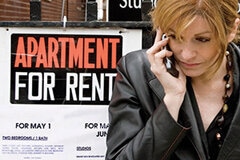Housing Opportunity Program for Landlords
 The Housing Opportunity Program (HOP) provides Mobility Counseling to assist Housing Choice Voucher Program families use their voucher to find and move into quality housing in top-rated communities throughout the Philadelphia region.
The Housing Opportunity Program (HOP) provides Mobility Counseling to assist Housing Choice Voucher Program families use their voucher to find and move into quality housing in top-rated communities throughout the Philadelphia region.
HOP is open to households with vouchers issued by the Philadelphia Housing Authority. The program is a wonderful business opportunity, helping to mitigate the biggest challenge in managing residential property today: finding and retaining tenants who have a source of stable income to afford and make rent.
Housing matters
What matters to you most? If you’re like most landlords, it is steady cash flow. That is where the Housing Opportunity Program (HOP) can help. HOP is a new initiative under the larger Housing Choice Voucher Program (HCV Program).
The HCV Program is a federal rental assistance program that enables low- and moderate-income households who qualify to rent good housing in the private market. Households with vouchers are free to search for housing virtually anywhere. Once leased, the program pays a portion of the household’s rent directly to the landlord.
HOP offers landlords all of the traditional benefits of the HCV Program and more.
Location Matters.
The Housing Opportunity Program (HOP) is a housing mobility initiative aimed at assisting families participating in the Housing Choice Voucher program to explore housing choices and move to Opportunity Areas in Philadelphia and surrounding counties.
Here’s how the program works. Rather than search for housing completely on their own, households who volunteer for HOP are assigned a housing counselor. The counselor works with them to pinpoint their needs and then helps them to locate housing in Opportunity Areas that meet those needs.
Opportunity Areas are communities that are considered “high-performing” or that “offer exceptional opportunities” based on criteria measuring quality of life characteristics. The criteria include socio-economic diversity, low rates of violent crime, job growth, school quality, and the presence of businesses and other features such as transportation.
Inherent in this approach is the belief that housing is more than shelter. HOP offers households with vouchers a chance to change their address and their quality of life.
Business Matters.
A steady supply of units in Opportunity Areas is critical to the program’s success. HOP represents a wonderful business opportunity for landlords with units in these areas, offering substantial benefits. To find out if your unit(s) qualify for HOP, call (215) 684-4050.
Benefits Matter.
For landlords with qualifying units, the benefits of participating in HOP are tremendous. They include:
- Steady Cash Flow. The program serves as a buffer against these uncertain financial times when no one is immune from layoffs. If the tenant’s income goes down, the HCV Program picks up that portion of the rent and pays it directly to the landlord.
- Free advertising and marketing. Landlords enjoy free property listings, tenant referrals, open houses and other opportunities where they can interview and screen prospective tenants right on the spot.
- An additional Pool of Qualified Tenants. Households in HOP must complete mandatory training. Topics include how to be a good neighbor and how to be a good tenant-the type of tenant that landlords value.
- Program Liaison. Landlords are assigned a housing counselor to serve as a program liaison before, during and after leasing to a household in HOP. The counselor is there to answer your questions and assist with paperwork and other tasks to expedite leasing and minimize the time that your unit is vacant.
Information Matters.
 The fine print
The fine print
Steady cash flow. Free marketing and advertising. Qualified tenant referrals. Your very own program liaison. You might be wondering, “What is the catch?” Here it is. As a federally funded program, there is the inevitable paperwork and the unit must also pass inspection. At the same time, counselors will assist landlords in navigating the housing authority’s process. Below is an overview of the leasing process.
Step 1: Tenant Selection.
The household comes to view the unit. If the household likes the unit and passes the landlord’s screening and application process, the landlord fills out a Request for Tenancy Approval Form (RFTA) and returns the form to the Housing Authority. The RFTA requests basic information, including the unit’s location, amenities, and the requested rent.
Step 2: Housing Inspection.
After receiving the RFTA, the Housing Authority will schedule an Housing Quality Standards (HQS) Inspection. The HQS inspection is based on the premise that federal funds should not be used to subsidize substandard housing and that all households regardless of income have the basic right to live in housing that is safe, decent and sanitary.
Units in the voucher program must pass an HQS inspection before the tenant moves in and maintain HQS standards throughout the entire tenancy of the participant. In some municipalities, a certificate of occupancy and other documentation may be required as well.
Step 3: Rent Determination.
After the unit passes inspection, the housing authority will review the requested rent to make sure that it is reasonable for the area. Factors such as the unit’s size, location, condition, and amenities are considered.
Step 4: Execution of Leasing Documents.
If the landlord accepts the rent amount, the household and the landlord sign a lease; and the landlord and the housing authority sign a Housing Assistance Payment or HAP contract. The HAP Contract spells out the rights and responsibilities of the housing authority and the landlord under the program.
Step 5: Payments Begin.
Once leased, households pay 30-40 percent of their monthly income toward rent and utilities; the housing authority pays the rest, called a Housing Assistance Payment or HAP. The HAP is deposited directly into the landlord’s account every month. Rent from the tenant is due in accordance with the terms of the lease.
Contact Us
The Housing Opportunity Program
2013 Ridge Avenue
Philadelphia, PA 19121
(215) 684-4050
[email protected]

